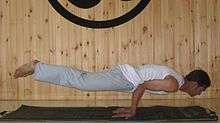Mayurasana

Mayurasana
Mayurasana (Sanskrit: मयूरासन) or Peacock Pose[1] is an asana where the individual assumes a peacock like posture. This asana tones up the abdominal portion of the body. It also strengthens the fore arms, wrists and elbows.
Cautions
Mayurasana is a very important balancing asana but demands physical strength. In this asana the entire weight of the body remains on the navel and it is possible to lose balance at any moment. Those suffering from cervical spondylitis are not recommended to practice it.
Etymology
The name comes from the Sanskrit words mayura (मयूर) meaning "peacock"[2] and asana (आसन) meaning "posture" or "seat".[3]
Description
In this asana oneself is raised like a horizontal stick holding the floor with both palms while the body is supported by the elbows.
Variations
- Pincha Mayurasana (पिन्च मयूरासन)[4] (Feathered Peacock Pose)[5]
- Padma Mayurasana (Lotus Peacock Pose)[6]
- Uttana Padma Mayurasana (Intense Stretch Lotus Peacock Pose)[7]
See also
References
- ↑ "Yoga Journal - Peacock Pose". Retrieved 2011-04-09.
- ↑ "Mayurasana - AshtangaYoga.info". Retrieved 2011-04-09.
- ↑ Sinha, S.C. (1 June 1996). Dictionary of Philosophy. Anmol Publications PVT. LTD. p. 18. ISBN 978-81-7041-293-9. Retrieved 9 April 2011.
- ↑ "Pincha Mayurasana - AshtangaYoga.info". Retrieved 2011-04-09.
- ↑ "Yoga Journal - Feathered Peacock Pose". Retrieved 2011-04-09.
- ↑ Ramaswami, Srivatsa; Krishnamacharya, T. (3 June 2005). The complete book of vinyasa yoga: an authoritative presentation, based on 30 years of direct study under the legendary yoga teacher Krishnamacharya. Da Capo Press. p. 208. ISBN 978-1-56924-402-9. Retrieved 9 April 2011.
- ↑ "Uttana Padma Mayurasana". Retrieved 2011-04-09.
Further reading
- Iyengar, B. K. S. (1 October 2005). Illustrated Light On Yoga. HarperCollins. ISBN 978-81-7223-606-9. Retrieved 9 April 2011.
- Saraswati, Swami Satyananda (1 August 2003). Asana Pranayama Mudra Bandha. Nesma Books India. ISBN 978-81-86336-14-4. Retrieved 9 April 2011.
- Saraswati, Swami Satyananda (January 2004). A Systematic Course in the Ancient Tantric Techniques of Yoga and Kriya. Nesma Books India. ISBN 978-81-85787-08-4. Retrieved 9 April 2011.
External links
This article is issued from Wikipedia - version of the 11/16/2016. The text is available under the Creative Commons Attribution/Share Alike but additional terms may apply for the media files.